新人教版初中英语八年级下册Unit2教案
- 格式:pdf
- 大小:75.30 KB
- 文档页数:25
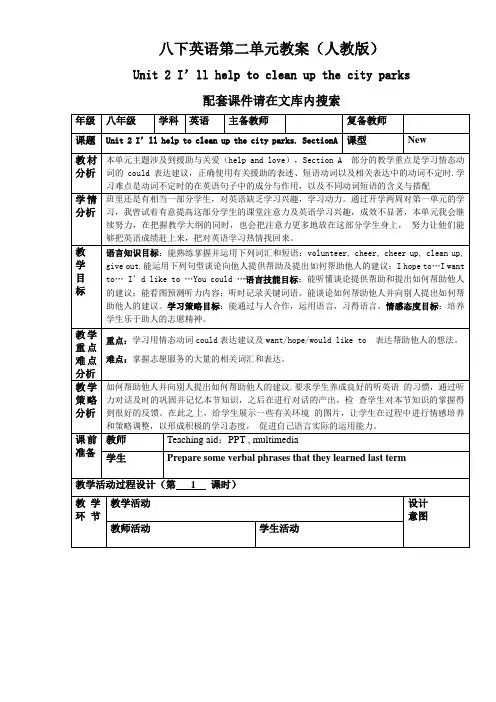
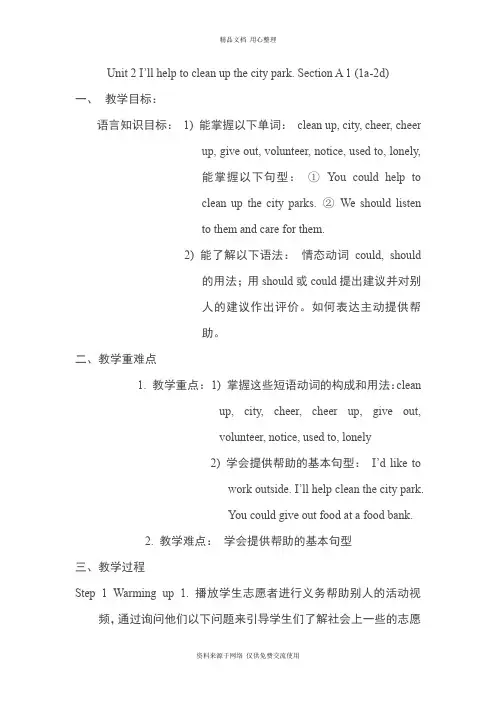
Unit 2 I’ll help to clean up the city park. Section A 1 (1a-2d)一、教学目标:语言知识目标:1) 能掌握以下单词:clean up, city, cheer, cheerup, give out, volunteer, notice, used to, lonely,能掌握以下句型:①You could help toclean up the city parks. ②We should listento them and care for them.2) 能了解以下语法:情态动词could, should的用法;用should或could提出建议并对别人的建议作出评价。
如何表达主动提供帮助。
二、教学重难点1. 教学重点:1) 掌握这些短语动词的构成和用法:cleanup, city, cheer, cheer up, give out,volunteer, notice, used to, lonely2) 学会提供帮助的基本句型:I’d like towork outside. I’ll help clean the city park.You could give out food at a food bank.2. 教学难点:学会提供帮助的基本句型三、教学过程Step 1 Warming up 1. 播放学生志愿者进行义务帮助别人的活动视频,通过询问他们以下问题来引导学生们了解社会上一些的志愿们进行的活动。
T: Who are they? S:They’re volunteers. They usually volunteer to help others. T: How could we help people? S1: We could clean up the parks S2: We could help sick people in the hospital. S3: We could help plant trees. …Step 2 New words 1. city n. 城市e.g. The library is in the north of the city. 图书馆在城市的北部。
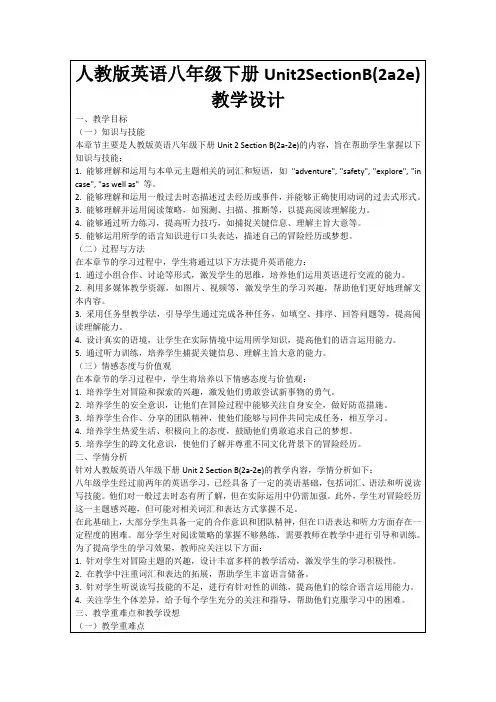
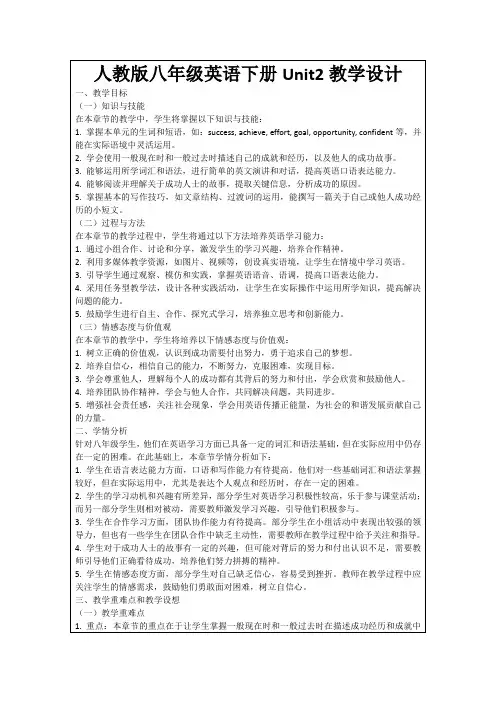
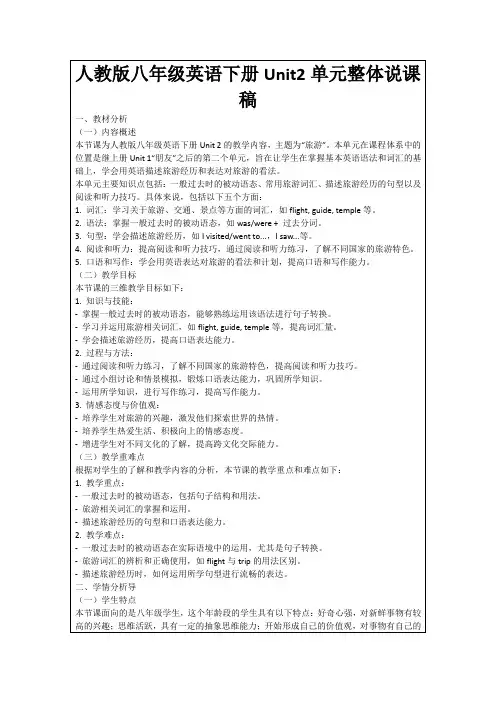
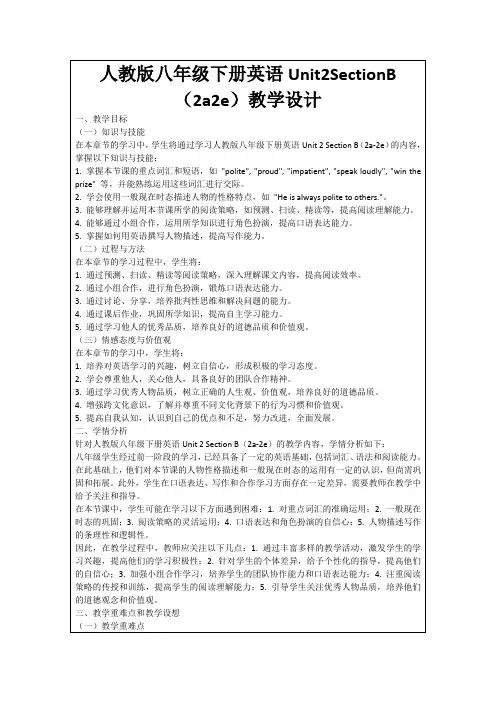
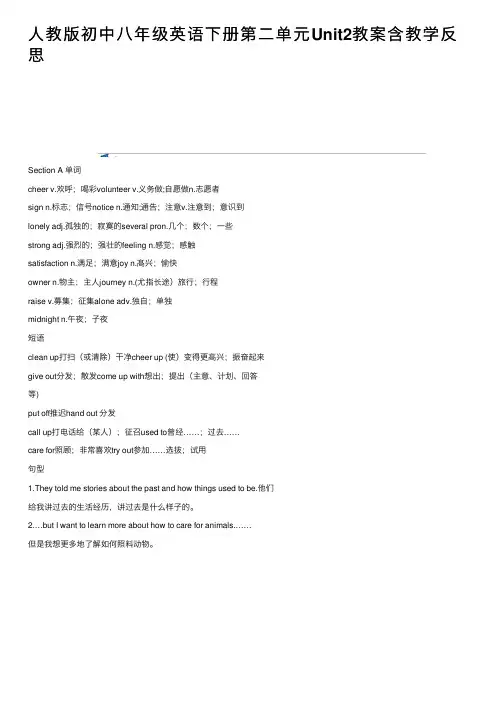
⼈教版初中⼋年级英语下册第⼆单元Unit2教案含教学反思Section A 单词cheer v.欢呼;喝彩volunteer v.义务做;⾃愿做n.志愿者sign n.标志;信号notice n.通知;通告;注意v.注意到;意识到lonely adj.孤独的;寂寞的several pron.⼏个;数个;⼀些strong adj.强烈的;强壮的feeling n.感觉;感触satisfaction n.满⾜;满意joy n.髙兴;愉快owner n.物主;主⼈journey n.(尤指长途)旅⾏;⾏程raise v.募集;征集alone adv.独⾃;单独midnight n.午夜;⼦夜短语clean up打扫(或清除)⼲净cheer up (使)变得更⾼兴;振奋起来give out分发;散发come up with想出;提出(主意、计划、回答等)put off推迟hand out 分发call up打电话给(某⼈);征召used to曾经……;过去……care for照顾;⾮常喜欢try out参加……选拔;试⽤句型1.They told me stories about the past and how things used to be.他们给我讲过去的⽣活经历,讲过去是什么样⼦的。
2.…but I want to learn more about how to care for animals.……但是我想更多地了解如何照料动物。
句型1.I’m sure you know that this group was set up to help disabled people like me.我确定你知道这个团体是为了帮助像我这样的残疾⼈⽽建⽴的。
2.You helped to make it possible for me to have Lucky.有了你的帮助,我才有可能拥有“幸运⼉”。
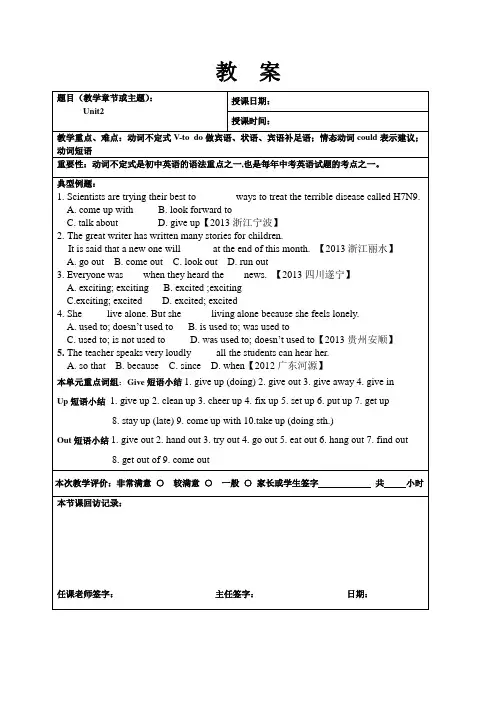
教案讲义学生:任课教师:例:Several boys were injured. 有几个小伙子伤了。
My friend speaks several languages. 我的朋友能讲几种语言11. Last year, she decided to try out for a volunteer after-school reading program.去年,她决定尝试在一个课后阅读项目中做一名志愿者。
【解析】try out 尝试;实验【拓展】try on 试穿①We should __________________(尽最大努力)to be happy in the future.②We should try ___ much fruit.A. eatB. to eatC. eatingD. eats12. care for sb./sth.照顾;照料care【名词】小心,关心;take care of = look after →【动词】care about sb./sth.关心,在意某人/事例:Many students in our school _______ the old and they usually offer their seats to them on buses. A.worry about B. care for C. agree with D. take care【拓展】care的短语总结take care =be careful v.当心,小心;take care of =look after v.照顾,照料,照看take care of 处理,做完练习:Thanks for your invitation, but I’m so sorry I can’t go. I need to ______ my baby at home. A. take away B. take off C. take care of D. take out of13. But I want to learn more about how to care for animals...但是我想学习更多的关于如何照顾动物的知识【解析】―疑问词+不定式‖作及物动词的宾语,【记】:I don’t know what to do.I don’t know how to do it. I don’t know what to do with it.【拓展】v+up with构成的短语:catch up with赶上;追上;put u with容忍;忍得住;keep up with 跟上;跟、保持联系end up with 结束;以.......而结束17.They told me stories about the past and how things used to be.他们给我讲过去的故事,并告诉我过去事情是什么样子的。
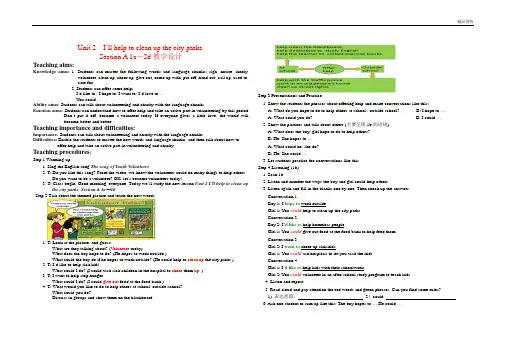
Unit 2 I’ll help to clean up the city parks.Section A 1a—2d教学设计Teaching aims:Knowledge aims: 1. Students can master the following words and language chunks: sign, notice, lonely, volunteer, clean up, cheer up, give out, come up with, put off, hand out, call up, used to,care for.2. Students can offer some help:I’d like to / I hope to/ I want to/ I’d love to…You could …Ability aims: Students can talk about volunteering and charity with the language chunks.Emotion aims: Students can understand how to offer help and take an active part in volunteering by this period.Don’t put it off, become a volunteer today. If everyone gives a little love, the world willbecome better and better.Teaching importance and difficulties:Importance: Students can talk about volunteering and charity with the language chunks.Difficulties: Enable the students to master the new words and language chunks, and then talk about how to offer help and take an active part in volunteering and charity.Teaching procedures:Step 1 Warming-up1. Sing the English song The song of Youth V olunteers2. T: Do you like this song? From the video, we know the volunteers could do many things to help others.Do you want to be a volunteer? OK, let’s become volunteers today!3. T: Class begin. Good morning, everyone. Today we’ll study the new lesson Unit 2 I’ll help to clean upthe city parks. Section A 1a—2dStep 2 Talk about the themed picture and teach the new words.1. T: Look at the picture, and guess:What are they talking about? (V olunteer today)What does the boy hope to do? (He hopes to work outside.)What could the boy do if he hopes to work outside? (He could help to clean up the city parks.)2. T: I’d like to help sick kids.What could I do? (I could visit sick children in the hospital to cheer them up. )3. T: I want to help stop hunger.What could I do? (I could give out food at the food bank.)4. T: What would you like to do to help others at school/ outside school?What could you do?Discuss in groups and show them on the blackboard. Step 3Presentations and Practice1. Show the students the phrases about offering help and make conversations like this:A: What do you hope to do to help others at school / outside school? B: I hope to …A: What could you do? B: I could …2. Show the pictures and talk about others (主要呈现1b的语块)A: What does the boy/ girl hope to do to help others?B: He/ She hopes to …A: What could he/ she do?B: He/ She could …3. Let students practice the conversations like this.Step 4Listening (1b)1. Scan 1b.2. Listen and number the ways the boy and girl could help others.3. Listen again and fill in the blanks one by one. Then check up the answers.Conversation 1Boy 1: I hope to work outside.Girl 1: You could help to clean up the city parks.Conversation 2Boy 2: I’d like to help homeless people.Girl 1: You could give out food at the food bank to help feed them.Conversation 3Girl 2: I want to cheer up sick kids.Girl 1: You could ask hospitals to let you visit the kids.Conversation 4Girl 1: I’d like to help kids with their schoolwork.Girl 2: You could volunteer in an after-school study program to teach kids.4. Listen and repeat.5. Read aloud and pay attention the red words and green phrases. Can you find some rules?1) 表达意愿:2)could6. Ask one student to sum up like this: The boy hopes to … He could …Step 5 Presentations and Practice1. Present the conversations.T: A group of students are planning a City Park Clean-Up Day. They need to come up with a plan to tell people about the city park clean-up. Clean-up Day is only two weeks from now. They can’t put off making a plan.—What could they do to tell people about it? —They could …put an ad on TV put up some signs call up some studentsput an ad in the newspaper hand out notices2. Let the students practice conversations according to language chunk packages.Step 6 Listening (2a, 2b)1. Play the tape for the Ss to listen and check(√): What are they going to do to tell people about it?2. Read the plans in 2b.3. Listen again and fill in the blanks.4. Listen again and check the answers.5. Listen and repeat, then read aloud.6. Make a conversation using the information in 2a and 2b.Step 7 Role-play conversation1. Show and talk about the picture.Who are they in the picture?Where are they going? (An old people’s home)What could we do? (They could read the newspaper to the old people./ …)How do lots of old people feel? (They are lonely.)What should we do? (We should listen to them and care for them./ …) 2. Ask the students to read the conversation and answer the questions.(1) What is Helen doing this summer?(2) When did Tom work in an old people’s home?(3) What did Tom help out with? And what did the old people tell Tom?(Teach: used to)(4) How do lots of old people feel about their life?(5) What should we do to help the old people? And why?3. Play the tape for the students to listen and imitate.4. The students read the dialogue loudly. (Read and look up)5. Check up by completing the conversations.(循序渐进的对话练习,为学生脱稿交流做准备)练习(1)Helen: Hi, Tom. I'm making some plans to work in an old people's home this summer.Tom: Really? I did that last summer!Helen: Oh, what did they ask you to help out with?Tom: Mm ... things like reading the newspaper to the old people, or just talking to them. They told me stories about the past and how things used to be.Helen: That sounds interesting.Tom: Yeah, a lot of old people are lonely. We should listen to them and care for them.Helen: You're right. I mean, we're all going to be old one day, too.练习(2)Helen: Hi, Tom. I'm making some plans to work in an old people's home this summer.Tom: Really? I did that last summer!Helen: Oh, what did they ask you to help out with?Tom: Mm ... things like reading the newspaper to the old people, or just talking to them. They told me stories about the past and how things used to be.Helen: That sounds interesting.Tom: Yeah, a lot of old people are lonely. We should listen to them and care for them.Helen: You're right. I mean, we're all going to be old one day, too.练习(3)Helen: Hi, Tom. I'm making some plans to work in an old people's home this summer.Tom: Really? I did that last summer!Helen: Oh, what did they ask you to help out with?Tom: Mm ... things like reading the newspaper to the old people, or just talking to them. They told me stories about the past and how things used to be.Helen: That sounds interesting.Tom: Yeah, a lot of old people are lonely. We should listen to them and care for them.Helen: You're right. I mean, we're all going to be old one day, too.6. Prepare for Role-play in groups. (脱稿)7. Rewrite the passage with the following questions of 2d.(1) Where did Tom go last summer?(2) What did Tom help out with? And what did the old people tell Tom?(3) What is Helen doing this summer? And what does she think of working for the old people?(4) How do lots of old people feel about their life?(5) What should we do to help the old people? And why?Step 8 Summary.How to talk about volunteering?Step 9 Writing1. T: Just now we talked about the volunteer work. Now I’ll show you others’ volunteer work. Pleaseenjoy and guess : What kinds of volunteer work could we do? (多媒体播放后,打开学生思维,让学生尽情表达。
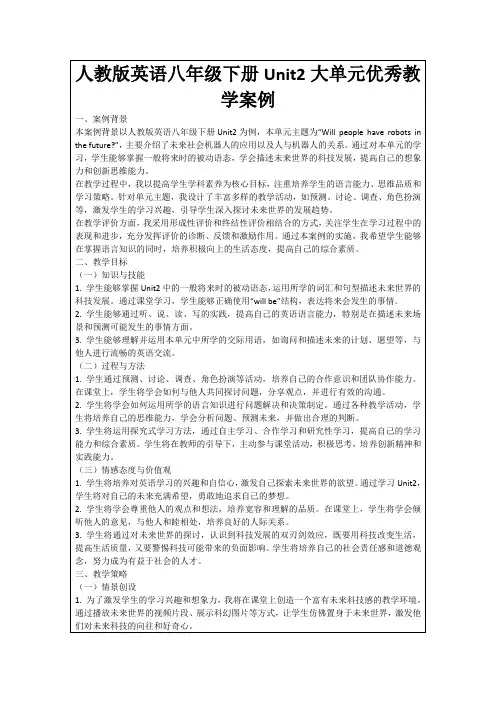
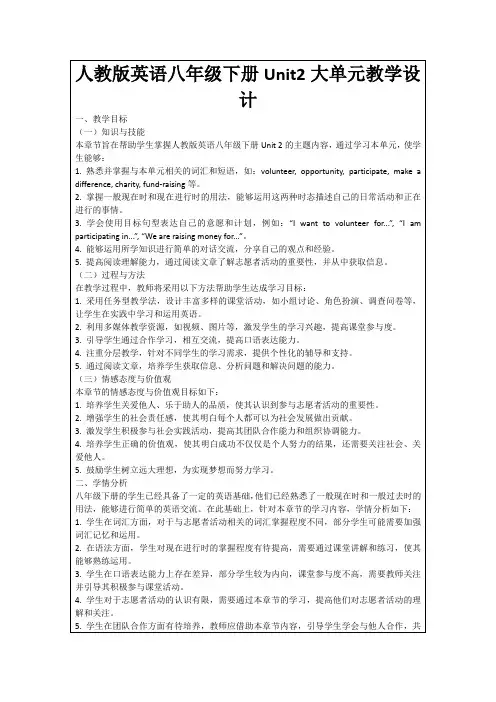
八年级英语下册Unit2教案(精选4篇)八年级英语下册Unit2 篇1unit 8 topic 11. 1)so …that …如此…以至于….,that 引导的是结果状语从句,其结构是so +形容词或副词+that 从句。
2)so…that …可以换成such +(a/an)+形容词+名词。
2. would like 作为一个固定结构后接名词,代词,不定式作宾语,也可以用不定式作宾补,表示想要的意思。
1)would like sth. 想要某物;i would like some rice and pork 。
我想要一些米饭和猪肉。
2)would like to do sth. 想要做某事。
3)would like sb. to do sth. 想要某人做某事。
would like = want 想要1. be 为助动词,made 是及物动词make 的过去分词,of 后接宾语,be made of 的主语通常为成品。
be made from 后的原材料则看不出,be made in 主语是成品,介词in 后为产地,be made into 主语为原材料,介词into 后接成品。
the table is made of wood 。
这桌子是由木头制成的。
(可以看出原材料)paper is made from wood 。
纸是由木材制成的。
(看不出原材料)the comb is made in hong kong 。
这把梳子是香港制造的。
iron is made into knives 。
铁可以制成小刀。
2. afford 常接在can ,could ,be able to 之后,意为担负的起(…的费用,损失,后果等);抽的出(时间)。
afford 还有提供,给予,出产的意思。
3. on sale 上市;折价出售,减价出售。
for sale 待售,供出售。
7. (1)though 是从属连词,引导让步状语从句,和连词but 不能连用,但翻译时需译为但是。
Unit 2 I’ll help to clean up the city parks.Section A 1 (1a-2d)一、教学目标:1. 语言知识目标:1) 能掌握以下词汇:clean up, cheer, cheer up, give out, volunteer, come up with, put off, sign, notice, hand out, call up, used to, lonely, care for 能掌握以下句型:① You could help to clean up the city parks. ② We should listen to them and care for them. 2) 能了解以下语法:情态动词could, should 的用法;用should 或could 提出建议并对别人的建议作出评价。
如何表达主动提供帮助。
2. 情感态度价值观目标:在授课过程中渗透助人就是助己,在授课过程中渗透助人就是助己,助人收获快乐的情感目标,助人收获快乐的情感目标,助人收获快乐的情感目标,使学生在谈论使学生在谈论如何为别人提供帮助的对话中能意识到尽己所能,如何为别人提供帮助的对话中能意识到尽己所能,帮助他人,帮助他人,乐于奉献是一种良好的品德,培养学生为他人着想,热爱公益事业,乐于助人的优良品质。
二、教学重难点m1. 教学重点:1) 掌握这些词汇的构成和用法:clean up, cheer, cheer up, give out, volunteer, come up with, put off, sign, notice, hand out, call up, used to, lonely, care for 2) 学会提供帮助的基本句型:I hope to work outside. You could help to clean the city parks. The boy could give out food at the food bank. 2. 教学难点:学会提供帮助的基本句型。
英语人教版八年级下册Unit2PartA教学设计[五篇范文]第一篇:英语人教版八年级下册Unit 2 Part A 教学设计Unit 2 section A(3a-3c)教学设计教材分析:本单元的语言功能项目是“提供帮助”。
围绕“志愿活动和慈善事业”这一话题展开,Section A主要介绍单元基本语言内容,注重学生的听说能力和短语的积累。
教材通过谈论海报上帮助别人的方式导入本单元的重要句型和语法项目“动词不定式和用来表示建议的情态动词could”,然后通过听说训练落实这些语言项目。
学情分析:针对农村学生的英语基础较差,不断提高学生的学习兴趣的同时,上课还注意把握练习难度,对有问题的学生注意及时的给予帮助和鼓励。
【教学目标】Knowledge objective Get the students to be able to know the new words and expressions they learnt in this part Key words: several, feeling, satisfaction, joy, owner, journey 【教学重点】阅读短文,获得相关的信息。
通过阅读练习,来提高阅读能力。
【教学难点】理解并运用所学的词汇及表达方式【教学方法】PWP method, task-based method and interactive approach 【教学手段】A tape recorder, multimedia and some pictures 【教学过程】Teaching Procedures: Step 1 Warming up Watch a video and answer the questions.1.Where did they volunteer to work?2.What did they do there?3.What do you usually do on your free time? Would you like to volunteer to do anything for others?Ss try to answer the questions:1.They volunteered to work at the old people’s home.2.They made dumplings for the old people.They cleaned up their rooms.They talked with the old people.They sang and danced for the old people.… Step 2 Reading 1.3a:1.Tell Ss to read the article in 3a quickly and try to find the answers to these questions:(1)What does Mario love?(2)What does Mary love?(3)What do Mario and Mary volunteer to do? Ss read the article quickly and try to answer the questions: 2.方法指导:带着问题,然后快速阅读短文,争取在较短的时间内,找到答案。
教情分析:学情分析: 学法指导:Unit2 I'll help to clean up the city parks.Period 1 Section A (1a-2d)教学目标:1.重点单词:city ,cheer ,volunteer ,notice ,lonely2.重点短语:clean up ,give out ,cheer up ,make a plan ,make some notices ,come up with ,help out ,care for ,used to3.重点句式:I hope to work outside.You could help to clean up the city parks.The girl could visit the sick kids in the hospital to cheer them up.The boy could give out food at the food bank.We need to come up with a plan for the City Park Clean Up Day.I'm making some plans to work in an old people's home this summer.What did they ask you to help out with?A lot of old people are lonely.We should listen to them and care for them. 教学重难点:1.重点短语和句型2.动词短语和不同的介词、副词搭配的意义 教学过程:Step 1 情景导入Teacher :Do you know a volunteer ?Do you know what the volunteers do?Student 1:They help the old people.Student 2:They help do some cleaning.Teacher :What can you do to help the people who need your help ?Now please talkabout the questions in groups.环节说明:由志愿者的志愿活动过渡到学生讨论的话题,衔接自然,学生易于接受,能勾起学生的学习欲望。
Unit 2 I’ll help to clean up the city parks.Section A 1 (1a-2d)一、教学目标:1. 语言知识目标:1) 能掌握以下词汇:clean up, cheer, cheer up, give out, volunteer, come up with,put off, sign, notice, hand out, call up, used to, lonely, carefor能掌握以下句型:①You could help to clean up the city parks.②We should listen to them and care for them.2) 能了解以下语法:情态动词could, should的用法;用should或could提出建议并对别人的建议作出评价。
如何表达主动提供帮助。
2. 情感态度价值观目标:在授课过程中渗透助人就是助己,助人收获快乐的情感目标,使学生在谈论如何为别人提供帮助的对话中能意识到尽己所能,帮助他人,乐于奉献是一种良好的品德,培养学生为他人着想,热爱公益事业,乐于助人的优良品质。
二、教学重难点m1. 教学重点:1) 掌握这些词汇的构成和用法:clean up, cheer, cheer up, give out, volunteer,come up with, put off, sign, notice, hand out, call up, used to, lonely, care for2) 学会提供帮助的基本句型:I hope to work outside.You could help to clean the city parks.The boy could give out food at the food bank.2. 教学难点:学会提供帮助的基本句型。
三、教学过程Step 1 Warming up1. 播放学生志愿者进行义务帮助别人的活动视频,通过询问他们以下问题来引导学生们了解社会上一些的志愿们进行的活动。
T: Who are they?S:They’re volunteers. They usually volunteer to help others.T: How could we help people?S1: We could clean up the parksS2: We could help sick people in the hospital.S3: We could help plant trees.… Step 2 New words1. city n.城市e.g. The library is in the north of the city. 图书馆在城市的北部。
2. notice n.通知;通告;注意v. 注意到;意识到e.g. Please read the list on the notice board. 请读公告板上的名单。
3. sign n.标志;信号e.g. Look around, we could see no sign of life.环顾四围,我们看不出一点生命的迹象。
4. volunteer v.义务做,自愿做n.志愿者volunteer to do sth. 义务自愿做某事e.g. Many people volunteer to work on the farm. 很多人志愿到农场去工作。
5. clean up 打扫(或清除)干净e.g. The students take turns to clean up their classroom. 学生们轮流打扫教室。
6. give out 分发;散发请帮我将这些试卷发下去。
e.g. Please help me give out these test papers.7. cheer v.欢呼; 喝彩振作起来,消息还不算太坏。
e.g. Cheer up. The news isn’t too bad.8. lonely adj.孤独的;寂寞的e.g. I don’t feel lonely because I made new friends here.我不觉得孤独因为我交了新朋友。
9. used to 曾经……,过去…… 杰克过去很矮,但现在高了。
e.g. Jack used to be short, but now he’s tall.Step 3 Discussion1. 1a. Look at the ways you could help people in the pictures. Then list other ways.2. Ss discuss with their partners and write the ways one could help others:①Help plant trees by the river.②Help clean up the city park.③Visit the old people in the old people’s home.④Help young kids to learn English.Step 4 Listening1. T: Tell Ss to read the sentences in the chart. Make sure they know the meaning ofthe sentences.2. 1b. Play the recording for the Ss to listen and number the ways the boy and girlcould help others.___ The girl could visit the sick kids in the hospital to cheer them up.___ The boy could give out food at the food bank.___ The girl could volunteer in an after-school study program to teach kids.___ The boy could help to clean up the city parks.(Key: 3, 2, 4, 1)Step 5 Pair work1. Let Ss read the conversation in the picture.2. 1c. Use the information in the chart of 1b to make other conversations.A: I hope to work outside.B: You could help to clean up the city parks.…3. Let some pairs act out their conversations.Step 6 Listening1. 2a: T: A group of students are planning a City Park Clean-Up Day. Listen andcheck (√) the things they are going to do to tell people about it.1) Look at the pictures in 2a. Discuss the things they are going to do.2) Play the recording for the Ss to listen and check the pictures.3) Play the recording again to check the answers.keys: b, c, e2. 2b:1) Let Ss read the sentences b elow. Explain some main sentences for the Ss.Make sure they know what to do.2) Play the recording for the Ss to write the correct words in the blanks.○1We need to _____ ___ ____ a plan to tell people about the city park clean- up.○2Clean-Up Day is only two weeks from now. We can’t ___ ___ making a plan.○3We could ___ ___ signs.○4Let’s make some notices, too. Then I’ll ____ them ____after school.○5We could each ____ ___ 10 students and ask them to come.3. Play the recording again to check the answers.keys: ○1come up with ○2put off ○3put up ○4hand, out ○5call upStep 7 Pair work1. 2c. Tell Ss to make a conversation using the information in 2a and 2b.2. Let one pair to read out their conversation first.e.g. A: We need to come up with a plan for the City Park Clean-Up Day.B: Let’s have lunch first.A: No, we need to start now. Clean-Up Day is only two weeks from now.B: You’re right. We can’t put off making a plan. As we talk, I’ll write down our ideas. Then we can decide which ideas are best.A: Let’s make some notices, too. Then I’ll hand them out after school.B: And we could each call up ten students and ask them to come.3. Ss act the conversation in pairs. Ask some pairs to act out their conversations. Step 8 Reading and Role-play1. Read the conversations and answer the two questions:①Where’s Helen going to work this summer?__________________________________②What did Tom do to help the old people?____________________________________keys:She’s going to work in an old people’s home.Reading the newspaper or just talking to the old people.2. Read the conversation after the teacher.3. Practice the conversation with their partner. Then let some pairs to act out theconversation.Step 9 Language points1. They told me stories about the past and how things used to be.used to do sth. 过去常常做某事;表示过去习惯性、经常性的动作或状态,暗指现在已经不存在。